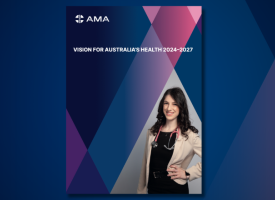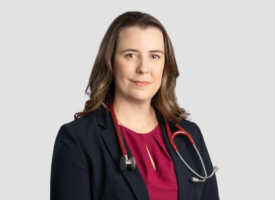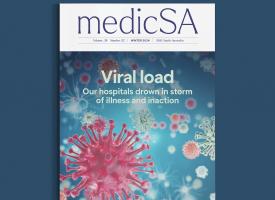AMA Transcript - Climate Change and Health, ISIS Doctor, Health Budget
Transcript: Joint Doorstop, Parliament House, 30 April 2015
A/Prof Brian Owler President Australian Medical Association
Ailie Gallant Research Fellow Monash University
Dr Celia McMichael Latrobe University
A/Prof David Harley National Centre for Epidemiology & Population Health
Subject: Climate change and health, ISIS doctor, Health Budget
BRIAN OWLER: Well, thank you for coming out to this launch of the Australian Academy of Science’s publication on climate change and the impacts for health for us as individuals, but also as an Australian community. I think it's an important publication that provides a lot of impetus for the Government to show leadership in terms of mitigating climate change, but also to make sure that we put in place the policies and institutions that are going to protect the Australian public from the health impacts of climate change, which now seem to be inevitable. I have already obviously done the conference inside. I'm happy to take questions on this or other topics as well.
QUESTION: You mentioned inside that government’s need to show leadership in the lead up to Paris. Do you think they've done enough to date, and do you have confidence that they will in the lead up to the conference?
BRIAN OWLER: No, I'm not sure that we've been well served in terms of climate change policy to date. I think we have been subjected to a lot of non-scientific debate. We need to get past the fact that climate change has become a political battleground, a political football. This is too important an issue for the Australian community, particularly when it comes to the health consequences, for politicians to argue about the science. They're not scientists. The overwhelming majority of scientists both here and abroad there is consensus that climate is warming, that humans play a part, and that there is an opportunity for governments and communities to actually play a part in mitigating climate change.
So in terms of the leadership that the Government can play, we're not expecting the Government to do something that is going to adversely affect the lives of - the daily lives of Australians in terms of policies and particularly when it comes to the economy, but I think that they can lead the discussion when it comes to climate change. We are a very big exporter of coal. Those are very important for - that's very important for the Australian economy, but still unless we actually face up to these issues we know that in the future that other economies are going to start to change, and, in fact, are already doing so, change the patterns of the types of fuels that they are going to use to run their economies in the future.
We know that Australia plays a leadership role in all sorts of other debates. I'm not really sure why this debate and this topic should be any different when it comes to the importance of climate change.
QUESTION: The AMA is calling for the establishment of a centre for disease control to help combat the health effects of climate change. Can you explain what that would be?
BRIAN OWLER: Well, look, one of the impacts of climate change in terms of health is we know that the patterns of disease will change when you start to get warming of the climate. We know that some of those tropical diseases, particularly those diseases that are carried by vectors such as mosquitoes are likely to appear in Australia in greater numbers, and they're likely to appear in the more southerly states.
Now, that might seem like it's some time off, but we're already starting to see that to some degree, and so we've got to be well prepared not only as a medical community in being able to recognise these diseases and provide the appropriate treatment to make sure that our doctors and health care workers are properly educated and trained to deal with them, but also to make sure that the public health policies are put in place, that we are actually on the lookout for the prevalence of these diseases, that we take the appropriate mitigation steps, particularly when it comes to some of these vectors such as mosquitoes, in some of the warmer parts of Australia.
So, I think a centre for disease control, as has been suggested by the Australian Academy of Science is something that the Government should closely look at and, as I've said before, it's not just about putting in place the policies, but I think the sort of institutions such as the centre for disease control, which actually can protect the Australian public from the effects of climate change, which in terms of health are, I think, going to be inevitable.
QUESTION: Leading the debate on climate change, what do you think that would look like for the Government, and how concerning is it for doctors, as you say, this lack of leadership by the Government
BRIAN OWLER: Well, when it comes to doctors, what I mean we know that there are many doctors in the community that are very concerned about the impacts of climate change. We know that there are going to be health consequences and so to put our head in the sand, to ignore the risk which is in front of us, and particularly when we know that these health consequences are inevitable, it's really just a matter of to what degree we subject ourselves and our future generations to. That is very frustrating
Doctors are also trained in science. We tend to think scientifically. That is the basis of medicine. And many doctors have looked at the science and agree with our colleagues in the science community that climate change is a real phenomenon and must be addressed.
Now, in terms of the leadership role that the Australian Government should play, I don't think it's for the AMA to actually specify exactly what the policy should be. I think there are much better qualified organisations and individuals to do that.
But I think, first of all, acknowledging the problem, acknowledging that humans do play a role and acknowledging the fact that governments do have to do something about this problem, not another token, but something more meaningful about this problem, and that Australia does have a role to play.
Even though it might be a relatively small population compared to the world, we know that we still are going to have an impact, particularly in our own region. So that's the sort of leadership that I think the Australian Government needs to play.
QUESTION: Dr Owler, on the weekend, a video released by ISIS showed an Australian doctor trying to recruit other Australian doctors to go and work for that terror group. What does that say about the critical education that's being provided as part of a medical degree? And are you concerned that other doctors might consider following....
BRIAN OWLER: Well, look, I don't think it actually says anything about the education received in our medical degrees. I think what it says is that there are individuals in our community and there are doctors out there as well, that are vulnerable, and doctors are not immune from these sorts of issues.
We know that there are some doctors that are vulnerable to these sorts of suggestions and may have a whole range of other issues going on in their life, and unfortunately, this individual seems to have succumbed to the message.
So this is not just about teenagers locked away in their bedrooms in the western suburbs of Sydney or Melbourne. This is actually about a whole range of individuals that can be affected by the messages that are coming from this terrible group.
The AMA does not obviously support doctors going and joining ISIS. First of all, it is against the law to do so. But this is a group that is doing terrible things, torturing people and killing, well, whole groups of the population in that region, and being associated with that group in any way, shape or form is abhorrent. And, you know, I think it's somewhat sad that this individual has succumbed to the message.
And obviously, I know that the Medical Board are looking at the case. There's no danger to the public at the present time. Their role is to protect the public. And I understand that they're working with the security agencies to make sure that they - that everyone - knows if this individual tries to re-enter Australia, that there's some action that will be taken.
QUESTION: Is he still on the medical - is he registered to practise here?
BRIAN OWLER: As I understand, he is still on the medical register. If you are convicted of a criminal offence, you obviously can be struck off. But there are other mechanisms as well. If you're not a fit and proper person to practise medicine according to the Board, then there is a process to go through.
I don't think it's really an issue as to whether he's on the register or not at this particular time. He's not in the country. He's not going to be able to practice. And as far as the Medical Board is concerned, their primary role is to protect the public. I understand that they are very likely to take steps to remove this individual's name from the register, but that is a process that they will go through.
I think it's important to recognise that having these sorts of legal processes, having these sorts of considered processes, is what sets us apart from these sorts of groups that seem to have anarchy. And so, I think it's right that we support the Board in undertaking those proper processes, and making sure that they continue to protect the public, which they're obviously doing.
QUESTION: There's talk that the Government is looking at cutting $7 billion from the health portfolio in the Budget. Does the size of those cuts concern you?
BRIAN OWLER: Well, that would be a very big surprise for the AMA and, I'm sure, doctors and the Australian public. The Prime Minister has said on a number of occasions that there would be no - first of all, no cuts to health, but second of all, has said that there will be no new health initiatives without the broad support of the medical profession. So, I would be very surprised if those sorts of measures were introduced without talking to the AMA or other health groups. Now, I heard some of those rumours as well and I put those questions directly to the Minister for Health who has reassured me that that is not going to be the case. But, obviously, we will be watching the Budget very closely and I expect that the - you know, we won't have any of those sorts of surprises that we had last time around in the Budget.
I think we're all tired of the last 11 months of discussion around the Budget measures from last year. I'm sure the Government doesn't want to have the same long drawn out discussion about - and battles that we've had over the past 11 months in the coming year. So, as I said, I would be very surprised, on the basis of the Prime Minister's comments but also on my discussions with the Minister for Health, if that were to be the case.
CELIA McMICHAEL: I'm Celia McMichael from Latrobe University and I'm Deputy Director of the Institute for Human Security and Social Change.
AILIE GALLANT: And I'm Ailie Gallant from Monash University, the School of Earth Atmosphere and Environment and I'm a Research Fellow.
QUESTION: Can you tell us what sorts of diseases and conditions Australians might be facing if we don't do anything about climate change?
CELIA McMICHAEL: We're looking at threats to, say, infectious disease and the distribution of things like dengue, changes to food borne diseases and vector borne diseases. But there are also threats that aren't so much about infectious disease but, say, risks to mental health consequences. For example, people who have food supplies or livelihoods disrupted, particularly in rural and remote areas.
And, regionally, there are going to be changes to health and population health associated with climate change. So, for example, the displacement or forced migration of people in the Asia Pacific region could be associated with particular threats to health. So, there are threats both nationally and internationally that are going to be pressing and urgent concerns for Australia to address.
QUESTION: Has there been any predictions about any increase in deaths that might result from these diseases?
CELIA McMICHAEL: Yes. I can't tell you the figures off the top of my head, but certainly there are predictions and, in fact, very clear assessments that there have already been increases to, say, deaths from heatwaves in Victoria and Sydney and other regions in Australia. And not deaths, but increased rates of illness of, say, dengue and food borne diseases. So, these are risks that we're already seeing, and we're going to be seeing in future years and decades.
AILIE GALLANT: I can just add to that and talk about, you know, for example, the heatwave prior to Black Saturday. Unfortunately, more people died during the heatwave, and these were vulnerable members of the community, the elderly mostly. And those heatwave conditions were unprecedented, and those kinds of heatwave conditions are certainly what we're going to see more of into the future.
QUESTION: So more people died in the heatwave than the fire?
AILIE GALLANT: Yes. They did. Yes.
CELIA McMICHAEL: And I guess on a topical note as well with the recent extreme kind of rainfall up in Sydney - although it's very difficult to attribute particular effects directly to climate change - what we're talking about is an amplification of things like extreme weather events, bushfires and heatwaves. So, when you think about climate change as a contributor to these kind of environmental disasters and changes, then there are very real risks which we've seen recently in Sydney with loss of life and injury and loss of - damage to infrastructure and livelihoods.
QUESTION: So from your research, what do you think needs to be done to help stem, to lessen those risks and threats?
AILIE GALLANT: Yes. I can answer some of that. I mean, certainly, look, a certain amount of climate change is inevitable in the system. While we certainly advocate the reduction of emissions, I think adaptation is something that is very real and we need to start considering adaptive practices.
In terms of the extreme weather events, things like emergency systems, making sure all members of the community are notified when there's an emergency, things like that right through to adaptive practices, say, in the food and water sector where we can adapt crops and things like that to changing environments so that we make sure that we have enough clean water and healthy food for us all to eat.
QUESTION: Do we need to think about changing the nation's vaccination policy to protect against all of these infectious diseases?
DAVID HARLEY: I'm happy to comment on it in some degree. Yes. This is a research interest of mine. You've raised the issue of vaccination policy specifically, and of course, there's been concern in Australia recently about falling vaccination rates in certain areas.
I think we'd forgotten, and I'm an old enough doctor to know, that kids and teenagers do die from vaccine-preventable diseases. But we need to understand the mechanisms that link the climate to infectious diseases, and perhaps we need to think carefully about which diseases we can prevent with vaccines.
A lot of the research effort, including some of my research effort, has been on mosquito-borne diseases. There's a vaccine in the wind for Ross River virus. I guess we need to ask questions about whether the routinely vaccine-preventable diseases are those which are going to be affected by climate change and, if so, how.
And there are quite a group of those - measles, mumps, rubella, hepatitis B, whooping cough - and perhaps the mechanisms are not so clear. Some of the things that Celia spoke about in her earlier discussion of climate change, and what Colin Butler and I referred to as the tertiary effects of climate change, may make inroads into the epidemiology of some of those diseases because we're going to have movements of human populations, we're going to have people within the Pacific coming into Australia and changes in - or potentially, and changes in the patterns of those diseases. So we will have to consider climate change impacts like that.
Having said all of that, I think that immunisation policy and maintaining immunisation rates in Australia is absolutely crucial, and we need to think about how climate change might impact infectious diseases.
30 April 2015
CONTACT: John Flannery 02 6270 5477 / 0419 494 761
Odette Visser 02 6270 5412 / 0427 209 753



